January 2022
By Dr. Gabrielle Moser, Assistant Professor, Aesthetics and Art Education, Faculty of Education, York University
How do people learn to become feminists? What are the pedagogical strategies that transfer knowledge between generations of feminist practitioners? And what happens when these strategies fail, as they often do? Why do some forms of feminist praxis fall out of the archive, or fail to make the “jump” between the “waves” of feminist politics? And lastly, how might aesthetic encounters offer a way to recover them—to activate what Elizabeth Freeman describes as the “undetonated energy from past revolutions”?
My research project, Transmitting Italian Feminisms, seeks to address these questions by conducting interviews with Italian women—both those located in Milan and those now living in Canada—who were active in the Italian feminist movement of the 1970s. Building on important recent scholarship by Helena Reckitt, Giovanna Zapperi, and York University professor Jacinthe Michaud’s recent book, Frontiers of Feminism: Movements and Influences in Québec and Italy, 1960–80 (2021), this oral history project hopes to shed light on the transnational connections between Italian and Canadian feminist movements, with a particular focus on uses of psychoanalysis and art-making as forms of critical public pedagogy.
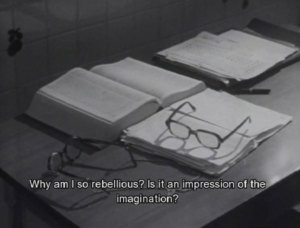
Image 1 (sources below)
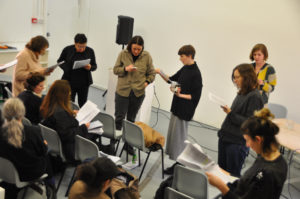
Image 2 (sources below)
Italian feminist thought from the 1970s is distinct from the better known “waves” of Anglo-American feminist activity in that it values disparities between women as a generative source of knowledge, and emphasizes practices of mentorship and entrustment (affidamento) between women. I am particularly interested in the practices of 1970s Italian feminism, especially those based in Milan and represented by the Milan Women’s Bookstore Collective and the Women’s Free University of Milan, which build on earlier Marxist and feminist organizing from the 1960s by blending consciousness-raising strategies, psychoanalysis, and a focus on friendship between women as a source of symbolic and political freedom.[1] Italian feminism in Milan is also unique in that it originates within workers’ education projects, and specifically the 150 Hours School: an adult education program offered in a partnership between the trade unions and the Italian government in the early 1970s. In this scheme, workers were given 150 hours of paid time from their employer for cultural and learning activities that they matched with 150 hours of their own time.
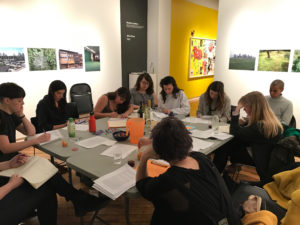
Image 3 (sources below)
But interestingly, the curriculum of the 150 Hours School was not standardized, nor focused on transferable skills, but was taught by philosophers including Lea Melandri and Paola Melchiori, with students reading Marxist theory, political philosophy and psychoanalysis. This radical pedagogical approach spurred the development of several smaller groups of women that dedicated themselves to studying sexual difference, to publishing the writing generated by the students, and to making artworks together. Adriana Monti captured some of the writing and knowledge produced out of the Women’s Free University of Milan in her documentary film, Scuola Senza Fine (1983), and also participated in the collective book/self-portrait published in 1978 by the “Wednesday group,” titled Ci vediamo mercoledi. Gli altri giorni ci immaginiamo (I’ll see you on Wednesdays. The other days, we’ll imagine one another). In other words, the Italian feminist movement that emerged out of Milan produced theory and practice alongside one another, but always through an aesthetic encounter with images or texts.
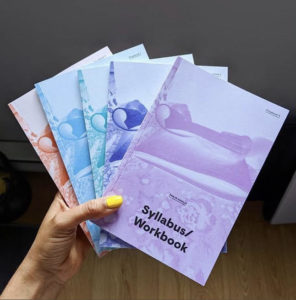
Image 4 (sources below)
This lineage of feminist thought is little known outside of Italy, in part due to the lack of translations of these texts, but also because many of the tenets of Italian feminism seem antithetical to Anglo-American feminist beliefs. Coming after the surge of feminist activity in England and North America in the 60s, Italian feminism sought to correct what they perceived as the failures of those earlier movements. The Women’s Free University of Milan, for instance, insist on private, symbolic relations as a site of political transformation, commit themselves to group psychoanalytic practices, and continue to staunchly refuse equality with men as the goal of feminism. But there has recently been a resurgence of interest in Italian feminism in contemporary culture outside of Italy, particularly through Elena Ferrante’s Neapolitan novels, and contemporary artworks by Alex Martinis Roe, Lucy Reynolds, and Claire Fontaine. These aesthetic encounters were my first introduction to Italian feminist philosophy in 2015, alongside my experience attending Now You Can Go, an 11-day program of workshops, public talks, film screenings and exhibitions inspired particularly by the work of Carla Lonzi, and organized by Reckitt and collaborators in what would become the Feminist Duration Reading Group in London, UK.
These encounters also inspired the formation of EMILIA-AMALIA, a feminist working group I co-founded in Toronto in 2016 alongside seven other writers, artists, designers, curators and scholars, with a shared interest in exploring some of the feminist movements that failed to make it into the dominant narrative of successive “waves” of feminist activity. Over the past six years, we have worked collaboratively to plan and deliver public programming that creates spaces for intergenerational exchange, mentorship, and collaboration. This commitment to non-hierarchical organizing builds upon an intersectional approach to feminist knowledge production, which insists that race, class, sexual orientation, gender, ability, and age are intersecting forces that determine how women are subject to power. Through our collaborative work, we learned that Melchiori and Monti, key figures in the Milan Women’s Free University, both live part time in Ontario, and we were able to collaborate with them on a series of events in 2017. These public talks and screenings also attracted several second-generation Italian immigrant women artists as participants, who are increasingly aware of the legacies of 1970s Italian feminism and are integrating their philosophies into their artistic and teaching practices.
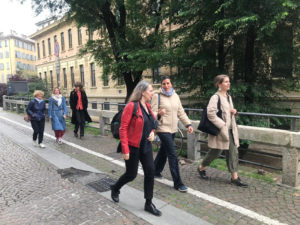
Image 5 (sources below)
Transmitting Italian Feminisms attempts to capture this intergenerational knowledge about the Milan Women’s Free University, and the wider Italian feminist movement, paying particular attention to its ongoing resonance in the present by capturing the narratives of women involved in the movement, and women who have come to know about it in Canada. Through the support of the Mariano A. Elia Research Fund, I am working with a team of collaborators—including curator and feminist scholar Helena Reckitt and curator and researcher Giulia Damiani—to pursue three related objectives: 1) To increase scholarly and public awareness of the pedagogical practices of the Women’s Free University of Milan in English speaking North America; 2) To analyze the educational strategies that were used to bring feminist ideas to working class women in Italy in the 1970s and 80s; and 3) To assess the ways that Italian women involved in this movement, now living in Canada, are transmitting these ideas to younger generations.
With the assistance of the Elia fund, the research team has been able to complete training in oral history methods with the Oral History Summer School, and we are now scheduling one-on-one interviews for spring 2022 with women in Milan and in Ontario to identify how they learned about Italian feminism, how it has impacted their life in Canada, and how they transmit these ideas and practices to younger women. In interpreting the data, we hope to attend to the insights of feminist researchers who suggest that experience, and the language used to describe it, are not stable entities but rather socially constructed, and to Lynn Abrams' important suggestion that oral histories themselves are constantly open to reinterpretation, functioning as “in the moment resolutions to major life conflicts.” While the oral histories will form an important archive of intergenerational and transnational feminist knowledge, and a source for practical knowledge about how feminist organizing and pedagogy happen “on the ground,” the research team also plans to develop knowledge mobilization strategies of our own to share these histories more widely, including a planned “listening party” to activate the interviews in Toronto and London (co-organized by EMILIA-AMALIA and the Feminist Duration Reading Group), and a long-term research creation project that will commission artists to respond to the audio archive with visual artworks for planned exhibitions in Canada and the UK.
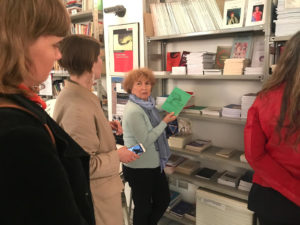
Image 6 (sources below)
Further Reading:
Cavarero, Adriana (2000), ‘On the Outskirts of Milan,’ in Relating Narratives: Storytelling and Selfhood, New York: Routledge, pp. 55-66.
Crenshaw, Kimberlé (1991), ‘Mapping the Margins: Intersectionality, Identity Politics, and Violence against Women of Color,’ Stanford Law Review 43:6 (July), pp. 1241-1299.
de Lauretis, Teresa (1990/1987) ‘Sexual Difference and Feminist Thought in Italy’ in Sexual Difference: A Theory of Social-Symbolic Practice, Patricia Cicogna and Teresa de Lauretis (trans), Bloomington and Indianapolis: Indiana University Press, pp. 1-24.
Disch, Lisa (ed, 2015) ‘1970s Feminisms,’ special issue of South Atlantic Quarterly 114:4 (October).
Freeman, Elizabeth (2010), Time Binds: Queer Temporalities, Queer Histories, Durham: Duke University Press.
Frisone, Anna (2018), ‘“Wandering Thoughts”; The Writing Experience of Working-Class Housewives in 1970s Milan,’ Gender & History 30:1 (March), pp. 177–195
Martinis Roe, Alex (2018), ‘An Exercise in the Practice of Affidamento,’ On Curating 36 (April), pp. 51-55.
Melandri, Lea (2018), Antonio Calcagno (trans), Love and Violence: The Vexatious Factors of Civilization, Buffalo: SUNY Press.
Melchiori, Paola (2006), ‘The “Free University of Women”: Reflections on the Conditions for a Feminist Politics of Knowledge,’ in Vasilikie Demos and Marcia Texler (eds), Gender and the Local-Global Nexus: Theory, Research, and Action, Bingley, UK: Emerald Group Publishing Limited, pp. 125–144.
---, --- (2015). ‘Psychoanalysis in Early Italian Feminism: The Contributions of the Practice of the Unconscious,’ in Antonio Calcagno (ed), Contemporary Italian Political Philosophy, Buffalo: SUNY Press, pp. 75-98.
Michaud, Jacinthe (2021), Frontiers of Feminism: Movements and Influences in Québec and Italy, 1960–80, Vancouver: University of British Columbia Press.
Milan Women’s Bookstore Collective (1990), Sexual difference: a theory of social-symbolic practice, Teresa de Lauretis (trans), Bloomington: Indiana University Press.
Monti, Adriana (dir, 1983), Scuola Senza Fine, 40 minutes.
Moser, Gabrielle and Helena Reckitt (2016), ‘Feminist Tactics of Citation, Annotation, and Translation: Curatorial Reflections on the Now You Can Go programme,’ On Curating 29 (May), pp. 42-48.
Reckitt, Helena (2016), ‘Support Acts: Curating, Caring and Social Reproduction,’ Journal of Curatorial Studies 5:1 pp. 6–30, doi: 10.1386/ jcs.5.1.6_1.
---, --- (2017) ‘Generating Feminisms: Italian Feminisms and the “Now You Can Go” Program,’ Art Journal, 76:3-4, pp. 101-111.
Captions:
[1] Still from Scuola Senza Fine (1983, dir. Adriana Monti).
[2] Lucy Reynolds’s Feminist Chorus for Feminist Revolt at The Showroom, London, UK, Dec 12, 2015. Photo: Ehryn Torrell.
[3] Participants at ‘We’re Not Here to Learn What We Already Know,’ an EMILIA-AMALIA session on how to write a good question about feminism, at Gallery 44 Centre for Contemporary Photography, 2017.
[4] EMILIA-AMALIA’s series of five self-published chapbooks. Photo: Zinnia Naqvi
[5] and [6]
In 2019, I traveled to Milan with Helena Reckitt and members of the Feminist Duration Reading Group to meet with the Women’s Free University of Milan.
[1] To speak of one ‘Italian feminism’ is to homogenize a diverse, regionally specific network of practices and philosophies that span Rome, Naples, Milan, and beyond that are often in conflict with one another about their politics and practices. Within Milanese feminism alone, there is dissensus between the Women’s Free University and the Women’s Bookstore Collective about where feminist politics unfolds—in the private or public sphere—and around the role of psychoanalysis and the use of the ‘symbolic mother.’ While the university has continued their collective analytic practices, and a commitment to writing as a form of knowledge production, the bookshop has moved to public events and book publications as a public representation of their politics (Melchiori 2015).

